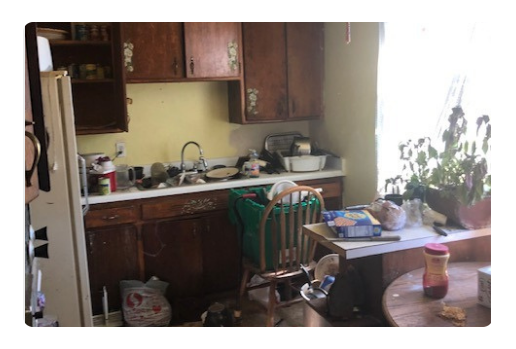
Jake Knight
Skye Homes Owner & Realtor

How to Sell a Distressed Property
Selling a home is not easy, not only because of the lengthy processes or volume of paperwork but more so because of the preferences and needs of the home buying market. People who are looking for properties for their new primary residence are very particular, magnifying every corner and making sure that their investment will be worth it.
This puts pressure on home sellers to ensure that their properties are picture-perfect, which makes it difficult to sell distressed property. However, that doesn’t mean it’s impossible. There is a market of homebuyers looking for properties that are not perfect but they can work with with a couple of repairs, renovations, or improvements.
The process of selling a distressed property will differ from the normal home selling process. There are a lot of things you will need to consider too. It’s important to be informed so that you can increase your chances of making a sale and receiving a good value for your distressed property.
Choose your real estate agent wisely.
Real estate agents are very knowledgeable about the home selling process and can help sellers advertise their properties and receive potential buyers. However, distressed properties are very unique, and if dumped in the regular market with a sea of perfect and well-maintained properties, making a sale will be difficult, if not impossible.
This is why you need a real estate agent who specializes in selling distressed properties. They would have the experience and expertise to know how to classify and advertise your property, which increases the chances of you making a sale.
Valuing a distressed property.
The typical process of coming up with a purchase price involves looking at the different properties in your area. However, this may not apply to distressed properties. There are more things to consider and calculate when pricing homes that are not in perfect condition.
Research and crunching the numbers become crucial at this point. You should always factor in the cost of repairs, renovations, and replacements that your potential buyer would have to make. To price your distressed property right, you may need professional valuations.
Valuing a distressed property involves assessing several key factors to arrive at a competitive price that attracts potential buyers while reflecting the property’s condition. Here are the primary considerations:
- Extent of Repairs Needed: Evaluate the scope of repairs, renovations, or improvements required to bring the property to a marketable condition. This includes structural issues, cosmetic upgrades, and essential repairs.
- Local Market Conditions: Research current market trends in your area, including demand for distressed properties, average days on market, and recent sales data for comparable properties.
- Comparable Sales Analysis: Conduct a comparative analysis of similar distressed properties that have recently sold in your neighborhood. Adjust the prices based on differences in property condition, size, and location.
- Professional Valuations: Consider hiring a professional appraiser or real estate agent experienced in distressed property sales to provide an accurate valuation based on thorough assessments and market expertise.
Understanding the difference between market value and distress value is crucial. Market value refers to the price a property would typically sell for under normal conditions, while distress value reflects the price it is likely to sell for in its current distressed state
.
Set a time frame.
Most homeowners selling their distressed properties end up taking the first offer that they receive so that they can dispose of the property immediately. Despite distressed properties being hard to sell, you can still get better offers if you wait a little longer.
When setting a time frame to sell your house, determine your priorities. Do you want to sell your house as quickly as possible regardless of the price? Or are you willing to wait for a better offer and allow your property to remain in the market for longer?
Provide full disclosure.
By default, home sellers are legally required to make full disclosures about the condition of the property. Everything from past repairs, issues, hazards, etc. should be brought to light. This is all the more important when selling a distressed property.
Make sure you are honest with your potential buyers about the condition of the property. Otherwise, you’ll risk facing legal issues in the long run. Buyers also tend to trust sellers who give full disclosures, which can result in a faster sale.
Marketing strategies for distressed properties.
Effective marketing is essential to attract the right buyers for your distressed property. Consider the following strategies:
- Highlight Renovation Potential: Showcase the property’s potential for renovation and improvement, emphasizing the value that buyers can unlock through strategic upgrades.
- Target Investors and Flippers: Reach out to investors and flippers who specialize in distressed properties. Highlight the investment opportunity and potential for profitable returns after renovations.
- Digital Marketing: Utilize digital platforms such as social media, real estate websites, and targeted online advertising to reach a broader audience of potential buyers.
- Virtual Tours and High-Quality Imagery: Provide virtual tours or high-quality images that showcase the property’s features while transparently presenting its current condition.
- Emphasize Post-Repair Value: Illustrate the potential increase in value after repairs and renovations are completed, showcasing the property’s future marketability.
The definition of distressed properties.
Distressed properties are real estate assets that face challenges such as structural issues, financial hardships, legal complications, or significant repair needs. Distress sales refer to transactions where these properties are sold under less-than-ideal conditions, often at a lower price than their market value.
Understanding the significance of distressed properties and distress sales is essential for sellers, buyers, and real estate professionals operating in this segment of the market.
Types of distress sales and cash purchases.
Distress sales encompass various scenarios where properties are sold under unfavorable conditions. Examples include:
- Foreclosures: Properties sold by lenders or banks due to default on mortgage payments.
- Short Sales: Sales where the proceeds are less than the outstanding mortgage balance, requiring lender approval.
- Financial Hardships: Sales prompted by financial challenges such as job loss, divorce, or inability to maintain the property.
- Cash Purchases: Many distressed property transactions, especially foreclosures or short sales, require cash purchases due to the urgency or condition of the property.
Understanding these transaction dynamics is crucial for both buyers and sellers involved in distressed property sales.
Selling a distressed property quickly.
To expedite the sale of your distressed property, consider the following tips and strategies:
- Competitive Pricing: Price your property competitively based on market valuations and comparable sales, factoring in the property’s condition and repair costs.
- Targeted Buyer Pool: Focus on reaching buyers actively seeking distressed properties, such as investors, flippers, and buyers willing to undertake renovation projects.
- Incentive Offerings: Offer incentives such as seller financing, closing cost assistance, or flexible terms to attract motivated buyers.
- Professional Network: Leverage the expertise of real estate agents specializing in distressed property sales, as well as property inspectors, appraisers, and legal professionals, to streamline the sales process.
By implementing these strategies, you can increase the likelihood of selling your distressed property quickly while maximizing its value.
Make minor improvements.
Distressed homes can be enhanced to make them look more appealing to potential buyers. So you might consider making minor improvements or performing small repairs. However, when doing so, make sure you don’t spend too much to the point that it offsets what you are able to earn. Limit your efforts to small changes like mowing the lawn, cleaning, or giving the exteriors a fresh coat of paint.
Consider other options.
Before selling your distressed property, you might have other options that can increase your earnings. For example, you can get a bank loan to renovate your property and engage contractors to repair or replace fixtures. Making big renovations can boost the property’s market value, enabling you to make more from a sale.
Another option is to sell your home to investors instead of homebuyers.
Legal and Financial Considerations.
Navigating the legal and financial aspects of distressed property sales requires expertise and attention to detail. Consider the following considerations:
- Disclosures and Regulatory Compliance: Fulfill all legal requirements for property disclosures, environmental assessments, and regulatory compliance to avoid potential liabilities.
- Tax Implications: Consult with tax professionals to understand the tax implications of selling or purchasing distressed properties, including capital gains taxes, deductions, and exemptions.
- Professional Services: Engage experienced real estate agents, attorneys, appraisers, and property inspectors to ensure a smooth and legally compliant transaction.
By addressing these legal and financial considerations, sellers and buyers can mitigate risks and ensure a successful outcome in distressed property transactions.
Sell Your Distressed Property to Skye Homes for Cash
Skye Homes is a direct buyer of properties across the United States. We are interested even in distressed homes and can purchase it from you as-is — without requiring you to make renovations, conduct repairs, or go through the lengthy and complex real estate transaction process.
Navigating the sale of distressed properties in Sacramento, the Bay Area, and California requires a strategic approach that considers valuation factors, effective marketing strategies, transaction dynamics, legal compliance, and financial considerations. By leveraging market insights, professional expertise, and innovative strategies, sellers and buyers can maximize opportunities in the dynamic and challenging distressed property market of 2024.
If you want to sell your distressed property fast and for a fair price, tell us about your property today and we’ll give you a no-obligation all-cash offer!

